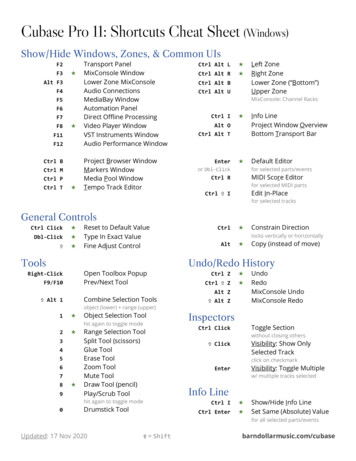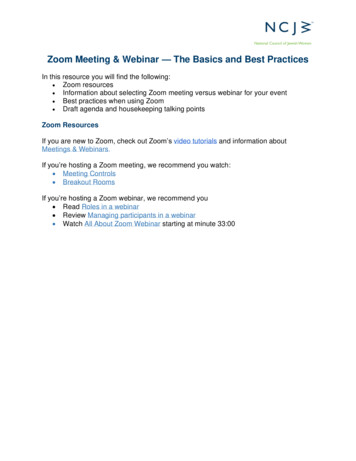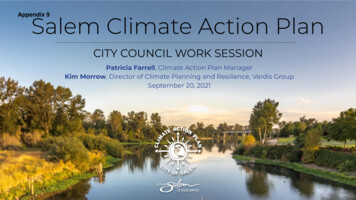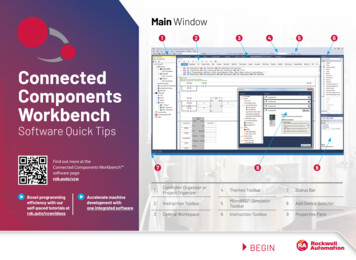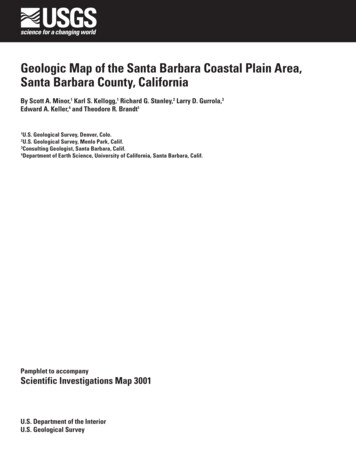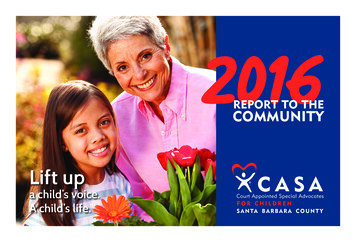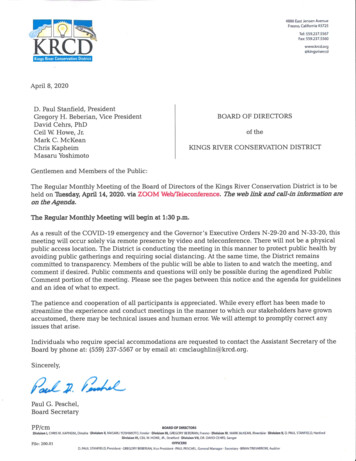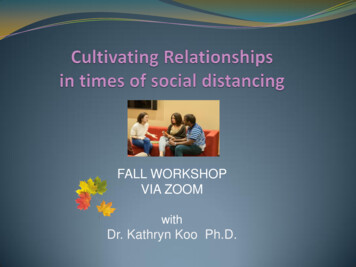
Transcription
FALL WORKSHOPVIA ZOOMwithDr. Kathryn Koo Ph.D.
About me Licensed Psychologist Health and Wellness Center at SAC Provide Psychological Counseling Workshops and Invited Lectures Clinical Supervisor at the Family Assessment CounselingEducation Services. Private Practice
IntroductionHuman relationships represent one of the most vital aspects of humanexperience. We will need to still maintain relationships whiledistancing from each other physically.This workshop will show you how to enhance and build relationships inyour life.
Learning objectives1. Consequences of prolonged Social Distancing andsocial isolation2.a.b.c.d.e.How to cultivate :Relationship with your selfRelationship with your significant otherFriendshipDating RelationshipRelationship with your Family3. Five Strategies to maintain quality relationship
Consequences of Social Distancing
Prolonged Social DistancingLeads to Increase a need for connection. More couples filing for divorce. React to others in a negative way. Can lead to Social Isolation.
What is social isolation?Defined as : living alone having small social network infrequent participation in social activities feelings of loneliness.
When social isolation prolongs Damaging to mental and physical health. More likely to feel depressed and lonely. Less able to deal with stressful situations. May have problems processing information (cognitivedecline). More susceptible to illness. Tend to suffer higher rates of mortality.
The movie castaway with Tom Hanks.
Why we need relationship Our brain needs stimulation. Social isolation leads tolack of stimulation and then affects our brainadversely. Because humans are social creatures. Without thisengagement and connections, we miss out onimportant social supports which contribute to feelingvalued, cared for, and part of a mutual system of caringfor others.
The vulnerables are: The Elderly Those with special need Children: brain development. Those who already experiencing loneliness.
Domestic abuse during pandemic Domestic abuse are likely to escalate and get worseunder these conditions as abusers get frustrated andtake it out on their usual targets. Domestic violence programs may be more limited thanusual. 800-799-7233 or thehotline.org.
If you are feeling lonelyConnect to statement that can be true: “I can do this, I’ve gotten through uncertainty before.” “I’m doing the best I can” Ask: “What resources do I need to cope better? –What’s missing for me right now?”. Bring up comfort or memories that bring peace
To Cultivate Relationship The best way: “cultivate” put time and energy intobuilding your relationship.
Cultivate Relationship with YourselfTake care of yourself first. Refer to Self care from lastworkshop. “You can’t take care of other people unlessyou first take care of yourself. Keep routines. Findmeaningful activities ex) creating something, writing ajournal, meditating.
Cultivate Your Significant Relationship Use this time to improve your relationship.---Ask yourself, “How do I want my relationship to change afterthis pandemic?” Increase positivity. Respect each other’s time and space. Make a plan(or schedule) for your household.Clean out things in the house, or find a new activity you can enjoydoing together.
Cultivate Your Friendship 30% of millennials surveyed --always or often felt lonely, 15% of baby boomers and 20 % of Gen X.1/4 -- have no acquaintances.22 % -- have no close friends30 % -- have no best friends.27% -- don’t need friends
why friendship? Friendships are a key component of a long and happy life. 17000 people survey found those with very few socialcontacts were 50% more likely to die from cardiovasculardisease. Spend 50 hours together to consider acquaintance and 90hours together to consider them a good friend
One Question Is there someone in your life whom you would feelcomfortable phoning at 4 am in the morning to tellyour trouble to?
Why difficult to make friends1) Shyness2) Lack of hobbies and interests that can facilitatefriendships.3) You are afraid to reveal yourself4) Frienship takes time, energy, cultivation.(50 hr for acq, 70 hr for frienship)
When you are Introvert Struggle of being in busy social situations. More comfortable to be alone, take solitary walk, sit back in social situation.May have social anxiety and shy.Maybe doing better during the quarantine.However, can isolate self too much.Use this time to venture out and connect with people.Using social medium maybe less threatening.
Cultivate friendship The basis of making friend is a shared experience.We need to seek out these experiences.1) Volunteer2) Meet-ups3) Clubs and groups on campus/ interest community.4) Hobby clubs, book clubs, yoga, baking. Remember, when you get over the initial awkwardness,then it takes time to move someone from anacquaintance to a friend. Nurturing friendship takes“EFFORT.” BUT PAYS OFF.
Cultivate Dating Relationship No longer dinner at a restaurant, movies or comingover for a drink. For many, video-chatting on either side of the screen,sit-down dinners, movie marathons and cocktails. Slowing down at the beginning of a relationship anddelaying physical intimacy has been conducive toeffective relationship.
Top tips for dating during a pandemic The basic rules still apply. Be clear of your expectations.Beware of text or chat disclosure.Give your virtual date nights a theme.Go on a socially distanced date.Write a love letter by hand.Get active with low-contact sports.Take this time to really get to know the person.
Your Family Society is built upon strong families. Family: teaches us how to function in the world.: s/d provide love and support you need in the world.How to build strong family relationship:1. Be a good listener. Strong families have goodcommunication. Where all family members feel heard and respected. Give the person your full attention, turn off the TV/media. Listen for how the other person is feeling and relay back.
Family relationship continues2. Encourage all family members to share their thoughts and feelings. Strong families allow all family members -- no matter how young orsmall Everyone should be expected to express themselves in appropriate ways-- such as with ― "I" messages. When people feel heard and respected,they feel better about themselves, are more open to solving problems,and are more likely to allow others to express themselves.3. Strong families spend time together. All relationships need attention -- includes the family as a whole. Family rituals can offer a set time for families to get together.Set aside a time on a regular basis for a family to get together.(dinner together, celebrating a holiday, church, or a walk together. Thefamily ritual should be predictable and preserved.
A dysfunctional family? 1. Start with forgiveness. Forgiveness is the decision tolet go of resentment and vengeful thinking. It doesn’tminimize or justify the wrong. 2. Look for the good in the person. When you are upsetwith someone, it’s hard to see that person in a positivelight. Ex) your brother is a really good father to hisson. Maybe your sister takes great care of sick mother.
3. Identify the real issue. Ask questions, verify or clarifyall assumptions.4. Practice boundary setting.
5 steps to cultivate all relationship Positivity:Having cheerful and uplifting interactions withothers. Finding ways to be positive with those we loveand care about can bring joy into someone’sotherwise stressful day.
Openness:Being open with others, discussing the relationship,sharing, and self-disclosing. Active listening, shownthrough eye contact, nodding, and verbalencouragement.
Share TasksPeople who share the work of maintaining their relationshipreport higher satisfaction than those who under or overbenefitted.
Networks:Maintain a shared network of people you both know,including family relationships. Shared contacts give yousomething to talk about.Friends can be introduced to one another to strengthenyour shared network.
Questions?
Cultivate Dating Relationship No longer dinner at a restaurant, movies or coming over for a drink. For many, video-chatting on either side of the screen, sit-down dinners, movie marathons and cocktails. Slowing down at the beginning of a relationship and delaying physical intimacy has been conducive to effective relationship.
